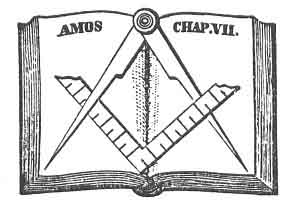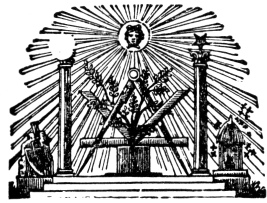p. 440
Third Part of the Code of the Illuminees.
Weishaupt, ruminating on what turn he should give to his Code of Illuminism, that its progress might be more subtile and infallible, expresses himself in the following terms, on the preparatory degrees which were to succeed to the novitiate of his pupils. “I am thinking of establishing, in the next degree, a sort of an academy of Literati. My design would include the study of the Ancients, and an application to the art of observing and drawing characters (even those of the living); and treatises and questions, proposed for public compositions, should form the occupations of our pupils.—I should wish, more especially, to make them spies over each other in particular, and over all in general. It is from this class that I would select those who have shown the greatest aptness for the Mysteries. My determination, in short, is, that in this degree they shall labour at the discovery and extirpation of prejudices. Every pupil (for example) shall declare, at least once a month, all those which he may have discovered in himself; which may have been his principal one, and how far he has been able to get the better of it.”
Ever influenced by a bitter hatred against the Jesuits, he does not blush to say—”I mean that this declaration shall be among us, what confession was among them.” Her was, however, unfortunate in his application; for in the Order of the Jesuits, no superior could ever hear the confessions of the Inferiors; and thus their very institutes rendered impossible the horrid abuse, under which Weishaupt affected to cloak the abominable breach of confidence with respect to his pupils, when he says, “by these means I shall discern those who show dispositions for certain special Doctrines relative to Government or to Religion.” 1
The statutes of their Minerval degree are drawn up with a little more circumspection, and simply declare, “that the Order in that degree wishes to be considered only as a learned society or academy, consecrating its toils to form the hearts and minds of its young pupils both by example and precept.” 2 These are called the Brethren of Minerva, and are under the direction of the Major or Minor Illuminees. The academy properly so called is composed of ten,
p. 441
twelve, and sometimes fifteen Minervals, under the direction and tuition of a Major Illuminee.
In the kalendar of the Sect, the days on which the academy meets are called holy, and its sittings are generally held twice a month; always at the new moon. The place where they meet is called, in their language, a Church. It must always be preceded by an anti-chamber, with a strong door armed with bolts, which is to be shut during the time of the meeting; and the whole apartment is to be so disposed, that it shall be impossible for intruders either to see or hear any thing that is going forward. 3
At the commencement of each sitting, the President is always to read, and, after his fashion, comment on some chosen passages of the bible, or Seneca, of Epictetus, Marcus Aurelius, or Confucius. 4 The care he takes to give to all these works the same weight and authority, will be sufficient to make the pupils view the Bible in a similar light with the works of the Pagan Philosophers.
This lecture over, each pupil is questioned “as to the books which he has read since the last meeting; on the observations or discoveries he may have made; and on his labours or services toward the progress of the Order.”
Nor are the studies and the books of which the Brethren are to give an account, left to their own choice. To each of these academies there is appropriated a particular library, whenever circumstances will permit, calculated to insure the spirit of the Order; and this collection the Sect takes care to furnish. By three different means it is accomplished. First, by the money which the Brethren contribute; secondly, by the list of his own private Library, which is exacted from each candidate, who is obliged to furnish therefrom such books as may be required of him; the third means is derived from Weishaupt’s grand principle, that every thing which is useful is an act of virtue. Now as it would be very useful for the Order to get possession of those rare books and precious manuscripts which Princes, Nobles, and Religious Orders keep shut up among their archives or in their libraries; all Illuminees acting as librarians or archive-keepers are admonished, exhorted, and seriously pressed not to make any scruple of secretly stealing such books or manuscripts, and putting them into the possession of the Sect. This is one of the most explicit lessons that Weishaupt gives to his adepts; at one time telling them not to make a case of conscience of giving to the Brethren what they may have belonging to the library of the Court; at another, sending a list of what should be stolen from that of the Carmes, he says, “all these would be of much greater use if they were in our hands.—What do those rascals do with all those books?” 5

Moe is the founder of GnosticWarrior.com. He is a father, husband, author, martial arts black belt, and an expert in Gnosticism, the occult, and esotericism.




